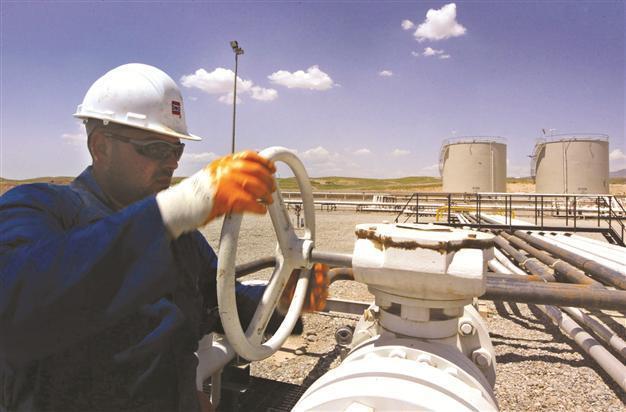Kurdish oil export to world ‘starts in May,’ Arbil and Ankara declare
OSLO/ARBIL

Kurdistan Regional Government (KRG) Prime Minister Nechirvan Barzani said they will start exporting oil as of May 2 – with or without the central Iraqi government’s consent. AFP Photo
Ankara and Arbil have announced plans to sell Kurdish oil stored in the Turkish point of Ceyhan as of the beginning of May, without waiting for Baghdad’s consent.Kurdistan Regional Government (KRG) Prime Minister Nechirvan Barzani said they will start exporting oil as of May 2 – with or without the central Iraqi government’s consent, speaking in an interview with Iraqi news outlet Rudaw.
“We have stored oil there and on May 2 we will start selling it,” the Kurdish prime minister was quoted as saying in the interview reported on April 28.
Turkish Energy Minister Taner Yıldız on April 29, one day after Barzani’s interview, confirmed the announcement, saying the Kurdish government may start selling oil in May.
“This oil belongs to Iraq; they may begin its export in May,” he said, answering reporters’ questions in Norway, where he went to meet with several representatives of the energy sector.
Baghdad has repeatedly threatened to sue Ankara and slash the Kurdish region’s share of the national budget if exports go ahead through the pipeline without its consent.
The pipeline was completed late last year, and oil has since been pumped through it into storage tanks at Ceyhan, but exports from the Mediterranean port have been on hold to give diplomacy a chance since the beginning of April.
However, both sides of the negotiation have recently adopted a more pessimistic tone over reaching an agreement on the issue, despite starting off hopeful.
“We went to Baghdad for talks, but they shocked us by cutting Kurdistan’s salaries. This would naturally cause delays in subsequent talks and how you deal with it in the future,” Barzani said.
In his remarks yesterday, Yıldız also announced oil flow between the KRG and Turkey has restarted.
“It [oil exports from northern Iraq] has been started for two days, with the amount we agreed upon initially of 100,000 barrels,” he said.
The Kurds have sent around 1.5 million barrels of oil through the new pipeline, but both Ankara and Arbil have been expressing hopes to double the daily flow amount to 200,000 after setting the conditions.
Yıldız also said buying Kurdish oil is not on Turkey’s agenda for now, but it is up to private sector representatives to engage in private deals with Arbil.
“Turkey’s being a customer [for Kurdish oil] is not at the issue. [Turkey’s oil refiner] Tüpraş has its own contracts as a private company. I always say, they can make their proposal to the private sector and carry out their trade if they agree on a contract,” he said.
When asked about potential oil sale to Turkey in the interview with Rudaw, Barzani also said there will not be any price exemption for Turkey, but if the country wants to buy oil, they can sell it.
“The oil we export we will sell at an international price. If Turkey wants to buy it, we will sell it to Turkey, or else we will sell it to other countries,” he said.
Budget issue
As part of the energy row, Baghdad has choked off funds to the northern region, draining its reserves, as the two regions spar over a national budget that would penalize the Kurdish government for failing to meet export targets, as well as other issues tied to energy sector regulations.
The central government and the Kurdish autonomous government differ over how to interpret the constitution’s references to oil and how revenues should be shared. The Kurdish share was set at 17 percent after the U.S.-led invasion in 2003, although the Kurds frequently complain they receive less than that.
When asked if the Kurdish government has braced itself for going ahead with the exports without Baghdad’s consent, Barzani affirmed and said they have “paid the price for it.”
He said Baghdad has not sent Arbil’s entire share of the annual budget since January, despite all other state institutions receiving their portion.
“Usually, when the annual budget is approved, all government institutions and ministries receive their share, but the only part of the country that has received only a tiny portion of its share is Kurdistan,” the website reported as him saying.
“Our monthly salaries are 850 billion dinars, but we have only received 500 billion. We received the same amount in February. In March and April we received nothing. That is the price,” he stressed.
“I assure everyone that we can pay out the salaries without Baghdad, and we have done it so far,” he added.
















